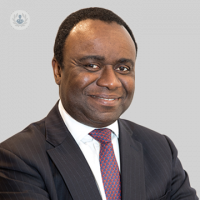Understanding the complexity of back pain
Written in association with:Back pain is not merely a discomfort; it’s a prevalent condition that affects millions worldwide, often presenting a complex interplay of physiological, psychological, and lifestyle factors. As an orthopaedic spinal surgeon with years of experience, Mr Colin Nnadi has witnessed first-hand the profound impact back pain can have on an individual's quality of life and overall wellbeing. In this article, he aims to shed light on the multifaceted nature of back pain, discussing its management strategies, and explores its implications on lifestyle.

Understanding the complexity of back pain
Back pain is a multifactorial issue, stemming from various sources such as muscle strain, ligament sprains, disc herniation, spinal stenosis, or degenerative changes in the spine. While acute back pain often resolves with conservative measures like rest, ice, and physical therapy, chronic back pain can significantly disrupt daily life and may necessitate more intensive interventions.
Impact on quality of life
The ramifications of back pain extend far beyond physical discomfort. Chronic back pain can lead to diminished mobility, reduced productivity, and a decline in overall quality of life. Simple tasks like bending, lifting, or even sitting for prolonged periods become daunting challenges. Moreover, the incessant pain can contribute to anxiety, depression, and sleep disturbances, creating a vicious cycle that further exacerbates the condition.
Management strategies
Effective management of back pain requires a comprehensive approach tailored to the individual's specific needs. As an orthopaedic spinal surgeon, I advocate for a multimodal treatment plan that combines conservative therapies with advanced surgical interventions when necessary.
Conservative measures such as physical therapy, chiropractic care, and medication management play a pivotal role in alleviating symptoms and improving function. Additionally, interventions like epidural steroid injections or nerve blocks can provide targeted pain relief for those with persistent symptoms.
For patients with refractory pain or structural abnormalities, surgical intervention may be warranted. Advances in minimally invasive techniques have revolutionised spinal surgery, offering shorter recovery times and reduced postoperative pain. Procedures such as discectomy, laminectomy, or spinal fusion aim to decompress nerves, stabilise the spine, and restore function, ultimately improving the patient's quality of life.
Lifestyle modifications
Beyond medical interventions, lifestyle modifications are paramount in managing back pain effectively. Maintaining a healthy weight, practising good posture, and engaging in regular exercise can strengthen the muscles surrounding the spine, providing added support and reducing the risk of injury. Ergonomic adjustments in the workplace or at home, such as using lumbar support cushions or standing desks, can also mitigate strain on the spine and alleviate discomfort.
Furthermore, adopting stress-reducing techniques like yoga, meditation, or deep breathing exercises can help alleviate tension in the muscles and promote relaxation, thereby minimising the impact of psychological factors on pain perception.
Mr Colin Nnadi is an esteemed adult and paediatric spinal deformity surgeon. You can schedule an appointment with Mr Nnadi on his Top Doctors profile.


